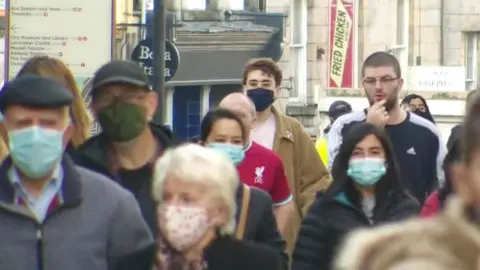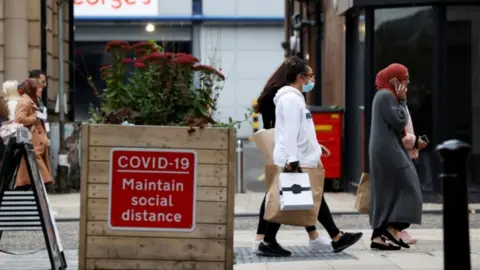Covid-19: Lancaster 'could move to lower tier' in review
 BBC
BBCLancaster could be moved into a lower tier than the rest of Lancashire when the government reviews its Covid-19 rules in December, a Tory MP has said.
Council leaders asked for the county to be split into two tiers, reflecting different virus rates, on 2 December when the England-wide lockdown ends.
The government rejected that plan and Lancashire was placed into tier three.
David Morris said Lancaster could now be "looked at separately" if it sees improvements by 16 December.
The latest government figures show a wide difference across the county, with Hyndburn seeing the highest rate - 407.2 cases per 100,000 people - on 22 November, while Lancaster registered 102 cases per 100,000, the lowest rate in the area, on the same day.
Morecambe and Lunesdale MP Mr Morris said he had raised Lancaster's lower case rate during a "helpful briefing" with Health Minister Ed Argar and understood "other factors" meant the whole area had been placed in tier three.
The BBC has contacted the Department of Health and Social Care for further comment.
 Reuters/Jason Cairnduff
Reuters/Jason CairnduffLancashire politicians reacted angrily to the tier three announcement on Thursday, having made a case to the government for Hyndburn, Rossendale, Burnley, Pendle and Preston to be placed in tier three and Fylde, Wyre, Lancaster, Chorley, South Ribble, Ribble Valley and West Lancashire in tier two.
Health Secretary Matt Hancock set out the reasoning behind the decision in a written ministerial statement, with the first review of the tiering scheduled for 16 December.
In a statement on Facebook, Mr Morris said he had been given "a commitment that if the epidemiology improves in the next two weeks in our area alone, it will be looked at separately to the rest of Lancashire".

Analysis - Mike Stevens, BBC Radio Lancashire political reporter
This will come as welcome news to politicians, residents and business owners in North Lancashire, who had begged the government to consider the area separately from the rest of the county.
Coronavirus rates in places like Lancaster, Morecambe and Wyre are similar to those in large parts of Cumbria, which will be placed in tier two.
Local politicians are now hoping that when the restrictions are reviewed after two weeks, ministers look at Lancashire as 14 separate boroughs rather than a single area.

In a similar move, Blackpool North and Cleveleys MP Paul Maynard has asked the government to explain why the town had been included in tier three after there had been a "consistent and sustained decline" in infection rates.
Blackpool had an infection rate of 205.1 per 100,000 people on 22 November, down from 291.2 per 100,000 a week earlier.
The Conservative MP said he wanted to see a more nuanced approach, as Lancashire was a "significant geographical area made up of distinct and diverse communities".
He added that the government should "replace a pan-Lancashire approach with more localised tiers".
'Naturally disappointed'
Elsewhere, a number of the region's other MPs and political leaders continued to voice their frustration at the decision to put the whole county into tier three.
Chorley MP Lindsay Hoyle, the current Speaker of the House of Commons, confirmed he had written to the prime minister, asking him to review the Lancashire-wide decision, while deputy speaker and Ribble Valley MP Nigel Evans told the Local Democracy Reporting Service said putting his constituency in the highest tier was "ludicrous".
Lancashire County Council's Conservative leader Geoff Driver said he wanted local politicians to have more say in the decision-making process because "we know our areas best" and added he was "naturally disappointed" that the whole county had been placed in the same tier.
Rossendale Council's Labour leader Alyson Barnes also criticised the decision and called for more support for businesses.
Miles Parkinson, leader of Labour-led Hyndburn Council, said the virus was continuing to have "a large impact" on the area, but he did not want to "prolong this suffering".
Mr Parkinson, whose council area has the highest number of cases in Lancashire, added: "The sooner we can bring our rates down and get restrictions eased the better."

Why not follow BBC North West on Facebook, Twitter and Instagram? You can also send story ideas to [email protected]
